10 June 2021: Clinical Research
Influence of the Expression of Personality Traits on Growing Intensity of Interdialytic Disorders and Change of Pro-Health Behaviors in Patients with Chronic Kidney Disease
Magdalena Lech1ABCDEFG*, Adrian Lech2BDF, Stanisław Niemczyk3DF, Arkadiusz Lubas4ADEFDOI: 10.12659/MSM.930151
Med Sci Monit 2021; 27:e930151
Abstract
BACKGROUND: The aim of this study was to assess the influence of socio-demographic and clinical factors on personality trait expression and their relationship with more intense interdialytic disorders and changes in health behaviors of patients with chronic kidney disease (CKD).
MATERIAL AND METHODS: A total of 200 participants were recruited for the research (84 women and 116 men; aged 61±12 years): 160 patients had CKD stage G4-G5 and 40 healthy participants constituted a control group. A diagnostic poll method was used in the research employing the following questionnaires to collect socio-demographic and clinical data: Health Behavior Inventory (IZZ), Personality Inventory (NEO-FFI), Beck Depression Inventory (BDI), and Researcher’s Questionnaire Test.
RESULTS: Statistically significant differences were found in the intensity of personal traits at different stages of treatment. The influence of factors resulting from CKD on the expression of personality traits increased with subsequent stages of treatment. Depression intensity was not connected with the expression of personality traits. A higher frequency of reported interdialytic disorders was significantly related to a higher degree of openness and conscientiousness and a lower degree of agreeableness. Increased extraversion, conscientiousness, and openness were significantly correlated with more intense health behaviors.
CONCLUSIONS: Personalities of patients with CKD changed with subsequent stages of treatment and were influenced by socio-demographic and clinical factors. Personalities affected the frequency of reported interdialytic disorders and health behaviors.
Keywords: Adaptation, Psychological, Depression, Hemodialysis Solutions, Psychological Tests, Psychology, Renal Insufficiency, Chronic, Anxiety Disorders, Employment, Health Behavior, Personality, Personality Inventory, Poland, Socioeconomic Factors, Surveys and Questionnaires
Background
There have been many scientific theories and attempts made to clarify the personality structure, its construction and development, and possibilities of affecting it. Personality is an unusually complex structure, and the process of its development is long-lasting and multi-faceted. There is a widespread belief that the development processes related to personality are reciprocal. Moreover, it has been confirmed that a decisive factor in personality development is the mutual interaction between the genotype and external factors. External factors can suppress or strengthen genetically determined traits. According to personality-focused studies, the key characteristics of a fully functioning individual are openness to experience, conscientiousness, extraversion-introversion, agreeableness, and neuroticism [1].
Studies on changing personality traits in patients with chronic illness and the impact of personality on health behaviors have been increasing in the literature [2–6].
This study aimed to assess the influence of socio-demographic and clinical factors on the intensity of the expression of personality traits and then to identify the interrelations between personality traits and interdialytic disorders and health behaviors in patients at different stages of chronic kidney disease (CKD) treatment.
Material and Methods
1. HEALTH BEHAVIOR INVENTORY:
The Health Behavior Inventory (IZZ) [7] questionnaire consists of 24 statements describing health-related behaviors. It is used to measure the general intensity of health behaviors and the intensity of 4 categories of health behaviors: appropriate eating habits, prophylactic behaviors, positive mental attitude, and health practices. The person surveyed rates the frequency of behaviors on a 5-point frequency scale (1=almost never, 2=rarely, 3=sometimes, 4=often, 5=almost always). The total value of the indicator ranges from 24 to 120 points. The higher the result is, the higher is the intensity of the declared health behaviors. After converting the total score into standardized units, the general index is interpreted as a standard tens (sten) score. The questionnaire is sufficiently reliable for the IZZ general result (α=0.85), and for individual behaviors, the Cronbach’s alpha fluctuated between 0.60 and 0.65. The IZZ has good psychometric properties in patients with CKD [8].
2. PERSONALITY INVENTORY:
The Personality Inventory (NEO-FFI) [9] questionnaire contains 60 items, 12 for each of the following 5 traits: neuroticism, openness to experience, agreeableness, conscientiousness, and extraversion. The person surveyed marks a response on a 5-point scale (1=strongly disagree, 2=disagree, 3=no opinion, 4=agree, 5=strongly agree). The raw result on each scale ranges from 0 to 48, and the result is interpreted as a sten score. The standards were made separately for men and women, with a subdivision into 5 age groups. A higher result on a given scale indicates a higher intensity of a particular personality trait. The Cronbach’s alpha for traits was between 0.68 and 0.82. The NEO-FFI has been shown to have good psychometric properties in patients with CKD [10].
3. BECK DEPRESSION INVENTORY:
The Beck Depression Inventory (BDI) is a tool used to assess depression symptoms in youth over 13 years of age and adults [11]. The test consists of 21 multiple-choice questions, which are answered by choosing 1 of 4 possible options. Each response is assigned a value from 0 to 3, which corresponds to the depression severity in a given area, including mood, interests, appetite, and sleep quality. The BDI has been shown to have good psychometric properties in patients with CKD [11].
4. RESEARCHER’S QUESTIONNAIRE TEST:
A researcher’s questionnaire test was developed for this study to collect socio-demographic data including age, sex, marital status, number of people in the household, presence of a household assistant, professional activity, nature of work, domicile, financial status, children, the recent loss of a close person, and stimulants and clinical data including time from starting dialysis, number of medications taken, comorbidities, disorders between dialyses, qualification for a transplant, transplantation in the disease history, type of vascular access, dialysis frequency and duration time, and distance and transportation to the dialysis unit.
The datasets used and analyzed during the present study are available from the corresponding author upon reasonable request.
STATISTICAL ANALYSIS:
The PQ Stat 1.6.8 statistical package was used for conducting statistical analysis. In the study, descriptive statistics were used for quantitative and qualitative variables (the mean with standard deviation, the median with minimum and maximum values, respectively). Calculations were made for the variables converted from raw values to sten scores, when they were required for a given test. The Mann-Whitney U test was used to check the differences between 2 groups. Where more than 2 groups were compared, the Kruskal-Wallis (ANOVA) test was applied. If ANOVA showed differences between groups, the Dunn-Bonferroni post hoc test value was calculated for identifying the groups which differed significantly. Interdependencies between the variables, assuming continuous values, were checked by calculating the correlation using Pearson’s
Results
For personality traits, patients on hemodialysis had lower levels of openness to new experiences and extraversion than the patients in the pre-dialysis period. In contrast, the highest levels of openness and extraversion were found in the groups of patients on hemodialysis for 1 to 5 years (group 4) (Table 1). Agreeableness was higher in patients on hemodialysis (groups 3–5) than in those in the pre-dialysis period (group 2), but it was highest in the group of patients who received hemodialysis for the shortest period (group 3). No statistically significant differences in the levels of conscientiousness and neuroticism were found between the groups.
An analysis of factors affecting personality (Table 2) showed the significant exclusive influence of factors unrelated to the illness (body mass index, education, presence of a household assistant, recent loss of a close person) in group 2 (Table 3). However, the influence of comorbidities, especially diabetes and coronary heart disease, was also significant. Transplant status and vascular access did not have an impact on personality.
The influence of CKD-related factors on the expression of personality traits increased with the successive stages of disease treatment. Hence, in group 5, 3 illness-related factors, namely chronic disease burden, number of medications taken, and distance to the dialysis unit, were significantly correlated with the expression of personality traits.
Although our research revealed a significant relationship between the successive stages of treatment and increases in depression (
The analysis of interdependencies between personality traits and the frequency of reported interdialytic disorders showed a significant correlation between a higher level of openness and conscientiousness in group 3 as well as more frequent reporting of interdialytic problems in patients with lower levels of agreeableness and conscientiousness in group 5 (Table 5).
We also found a significant correlation between the expression of personality traits and the intensity of health behaviors. Intense extraversion was significantly correlated with increased prophylactic behaviors in group 2 and health-enhancing practices, dietary habits, and prophylactic behaviors in group 3 (Table 6). Increased conscientiousness was correlated with higher levels of pro-health behaviors in groups 3 and 5, and with increased prophylactic behaviors in group 4. On the other hand, increased openness to new experiences was correlated with enhanced prophylactic behaviors in group 4 and a better mental attitude in group 5.
Discussion
Along with the progression of age, extreme personality traits decline in intensity unless they are enhanced by stressful life experiences [12–17]. Chronic diseases are associated with long-lasting stress and numerous limitations. Earlier research, which focused on the personalities of patients with CKD and was based on the “Big Five” model [24], showed the impact of personality on, among other things, health status, nutrition, depression, mortality, and quality of life.
The data obtained on the influence of chronic diseases on personality indicate that the intensity of personality traits changes under the influence of an illness [2,3]. Our research revealed significant differences between patients on hemodialysis and those in the pre-dialysis period but showed similarities between patients on dialysis for less than 1 year and longer than 5 years. Lower agreeableness and openness to new experiences in all patients on hemodialysis in comparison to patients before dialysis can show decreased trust and growing uncertainty of patients in connection with a “new stage” in the disease and its treatment. At the same time, similarities between the patients on hemodialysis <1 year and >5 years can result from the acceptance of the disease and adaptation to dialysis over time [18]. However, the similarities observed in the group of patients on hemodialysis can result from diametrically opposed situations. It is possible that the start of a new stage of treatment (hemodialysis) significantly different from the previous therapy in group 3 was connected with a sense of failure and uncertainty (high neuroticism, reduced extraversion, openness, and conscientiousness), which in group 4 yielded to the feeling of stability, disease control, and hope (low neuroticism, relatively higher levels of extraversion, openness, agreeableness, and conscientiousness) for health improvement and further plans, including kidney transplantation. Further, the lack of significant health improvement, complications occurring in the course of disease treatment, and loss of vascular access or progression of comorbidities (3 factors linked to the disease) can intensify depressive reactions and the sense of resignation (moderate extraversion and agreeableness, low conscientiousness and openness) [19].
Anxiety disorders and depressive disorders are among the 2 most frequent psychological problems in patients with CKD [20]. The latest scientific reports show that some personality traits have an impact on the risk of depression occurrence in chronically ill patients. However, results of those studies are not consistent in respect to specific personality traits as indicators of depression [21–23]. Similarly, our study did not confirm a significant correlation between the examined personality traits and intensity of depression.
Brickman et al showed that patients with high neuroticism after a kidney transplant reported abnormal post-transplantation symptoms more often than those with low neuroticism [24]. In our present study, personality traits also affected the frequency of reported dialysis-related problems. The patients characterized by higher levels of conscientiousness and openness reported health problems more often. This could result from the fact that they are more scrupulous and aim to achieve higher effectiveness of undertaken medical activities, which has been reported in other chronically ill patients [25–27]. In our research, more frequent reporting of health problems was linked to lower agreeableness. Antagonism is a hostile attitude which is characterized by a bad attitude toward therapy and more focus on oneself and one’s own health problems.
Research has found a significant influence of personality traits on pro-health behaviors [28]. Extensive research by Axelsson et al, which included 750 patients with chronic diseases, found a correlation between personality and medical adherence. Christensen et al reported that conscientiousness is the only domain correlating with medical adherence in patients on hemodialysis [29]. In the present study, intensified conscientiousness, extraversion, and openness were significantly associated with patients’ health-enhancing behaviors. Openness to new experiences and extraversion are the features of an active attitude connected with broadening one’s knowledge about health and the disease, which promotes interactions with other people and an exchange of information which can help them. Conscientious patients are more disciplined and are characterized by the ability to delay gratification. They show the strength of self-control in initiating and maintaining health behaviors related to recreation, sleep, and physical activity.
Although our results are promising, the present research has some limitations. To show the influence of the expression of personality traits on the intensity of interdialytic disorders and change of pro-health behaviors, we compared 4 groups of patients with different stages of CKD with a group of healthy individuals as controls. This could confound the presented results by different patient characteristics such as income, employment, and having a household helper. Moreover, it is possible that a change in study protocol, for example, to a longitudinal study in the pre-dialysis group and/or a cross-sectional study in dialysis groups, would be more effective in identifying factors related to the expression of personality traits and their influence on dialysis outcome. However, this requires further studies in larger groups of CKD patients.
Conclusions
ETHICS APPROVAL AND CONSENT TO PARTICIPATE:
The study protocol was approved by the bioethics committee of the Regional Medical Chamber in Warsaw. All participants provided voluntary and informed written consent to participate in the study.
Tables
Table 1. The intensity of the expression of personality traits at different stages of chronic kidney disease.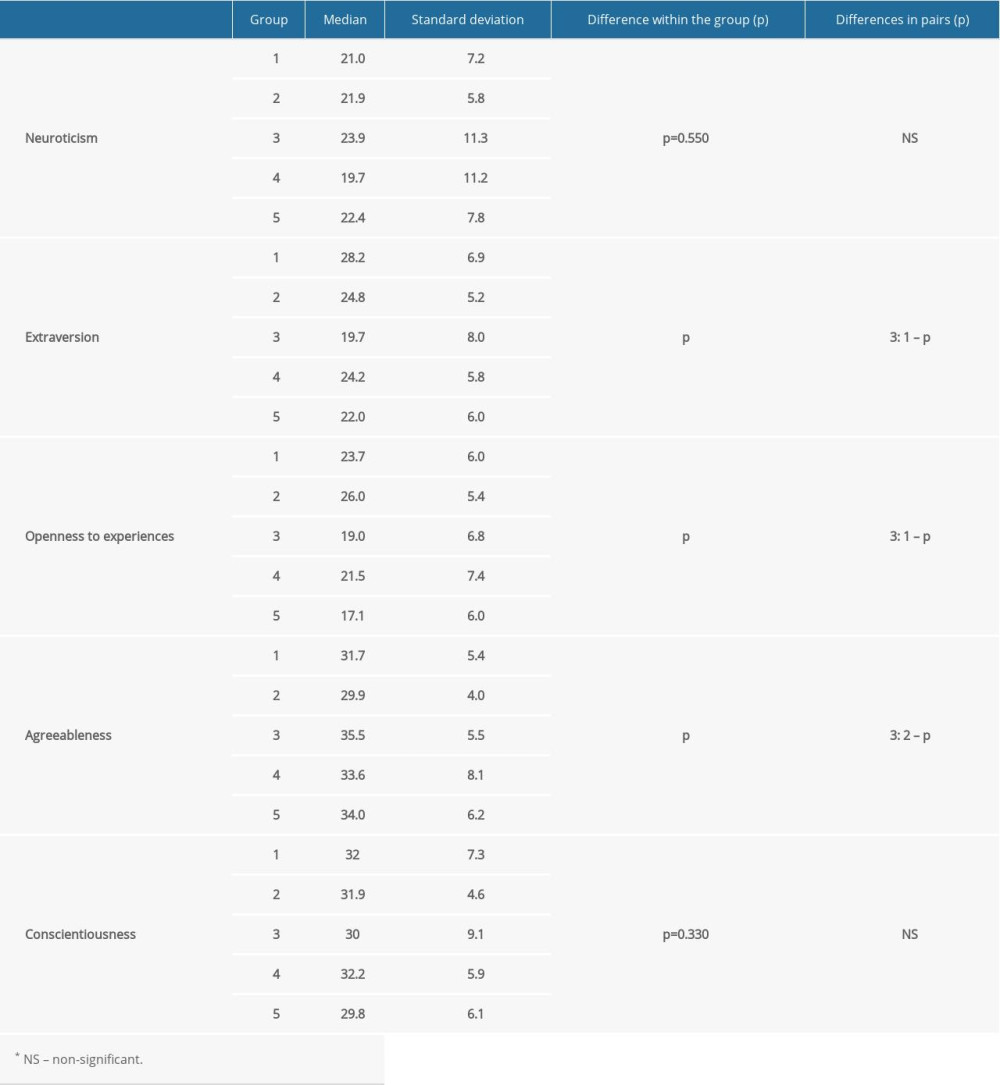 Table 2. Selected socio-demographic and clinical factors in researched groups.
Table 2. Selected socio-demographic and clinical factors in researched groups.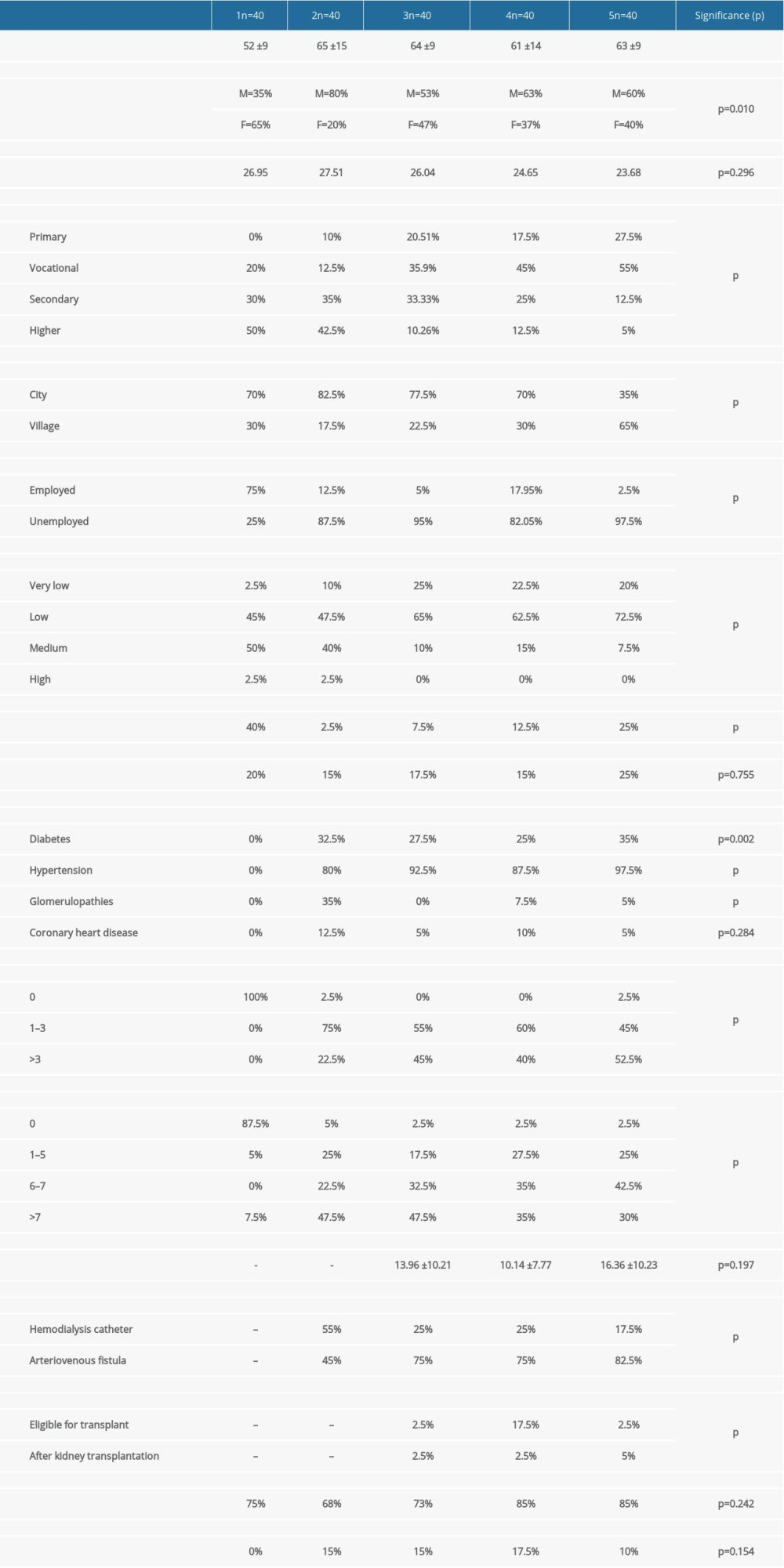 Table 3. Analysis of socio-demographic and clinical factors affecting personality.
Table 3. Analysis of socio-demographic and clinical factors affecting personality.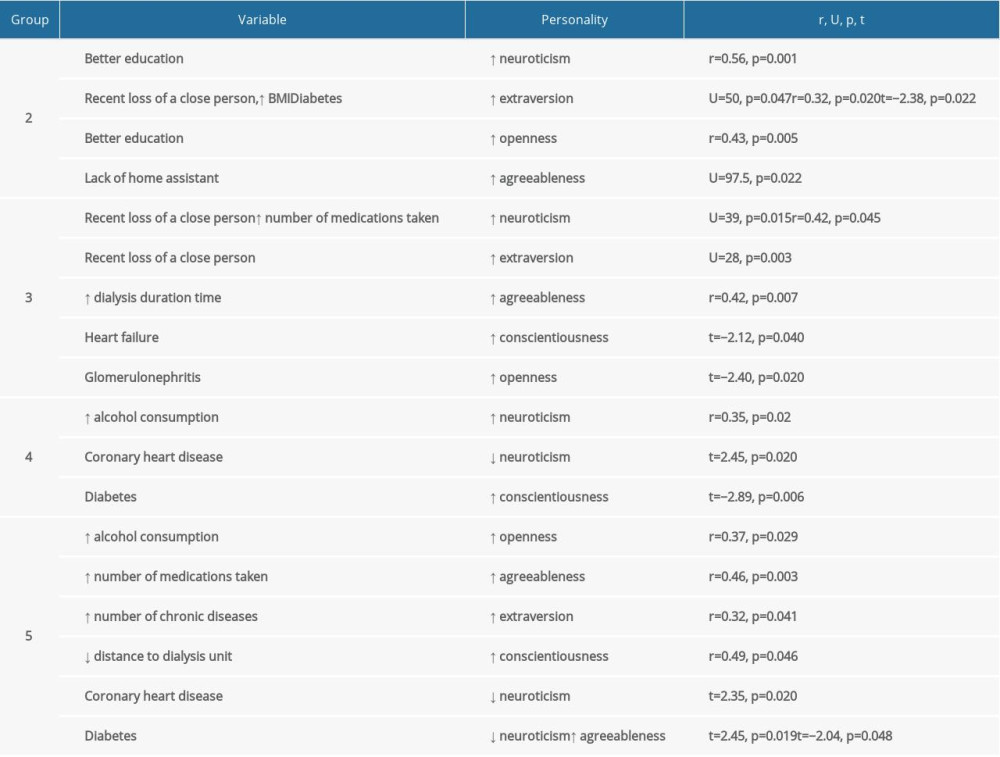 Table 4. Relationship between depression and the expression of personality traits.
Table 4. Relationship between depression and the expression of personality traits.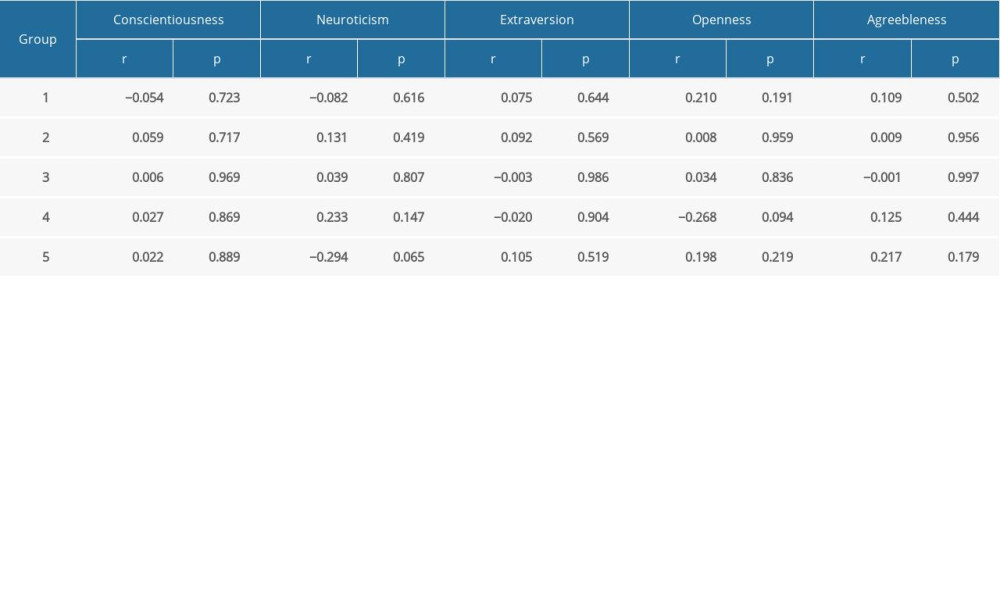 Table 5. Analysis of the influence of personality on the frequency of reported interdialytic health problems.
Table 5. Analysis of the influence of personality on the frequency of reported interdialytic health problems.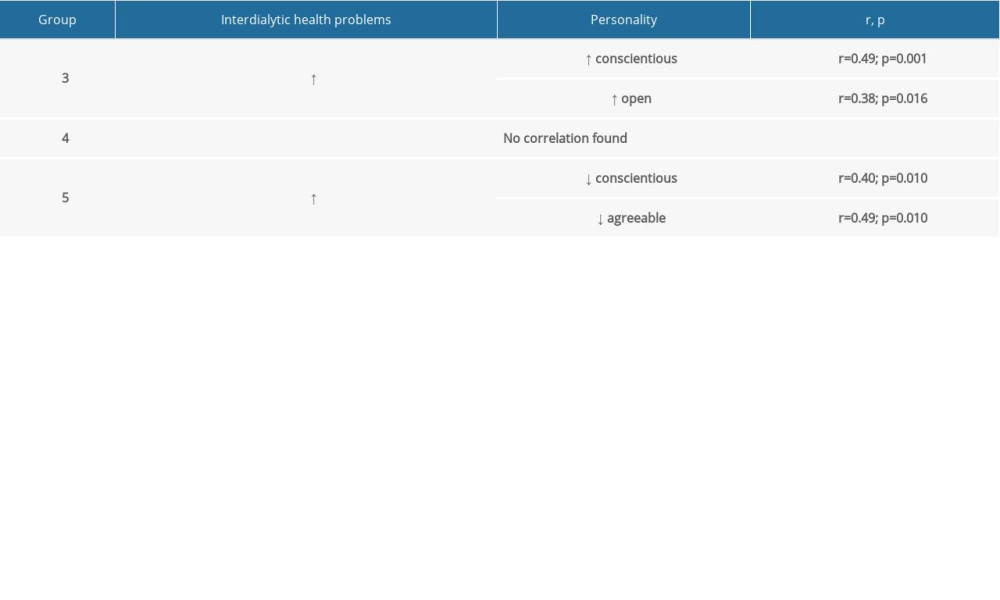 Table 6. Analysis of the influence of personality on health behaviors.
Table 6. Analysis of the influence of personality on health behaviors.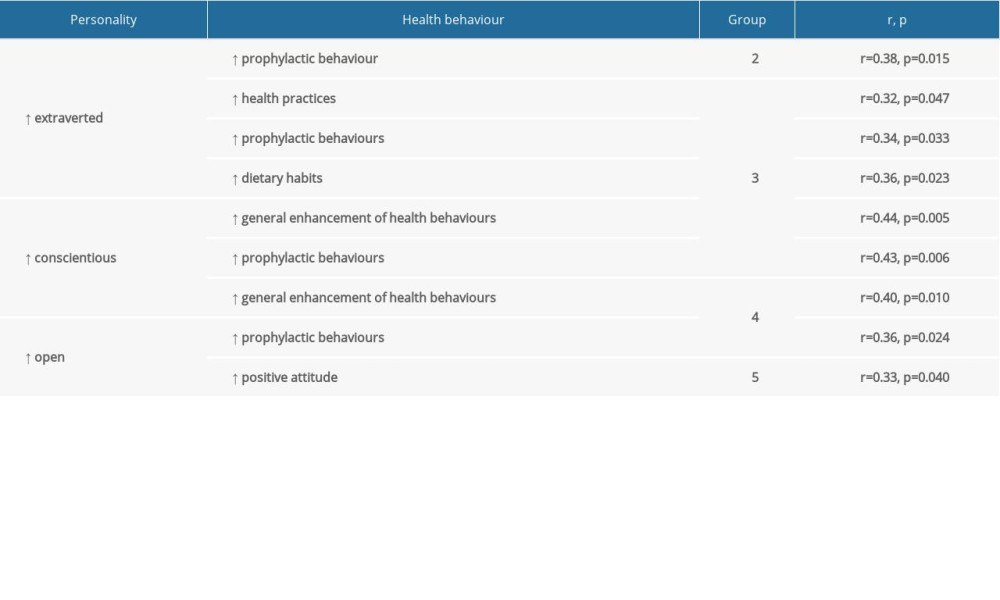
References
1. Gałecki P, Szulc A: Psychiatry, 2018, Warsaw, Edra Urban & Partner
2. Jokela M, Hakulinen C, Singh-Manoux A, Kivimäki M, Personality change associated with chronic diseases: Pooled analysis of four prospective cohort studies: Psychol Med, 2014; 44(12); 2629-40
3. Sutin AR, Zonderman AB, Ferrucci L, Terracciano A, Personality traits and chronic disease: Implications for adult personality development: J Gerontol B Psychol Sci Soc Sci, 2013; 68; 912-20
4. Fronczyk KSmoking and personality traits – literature review: Roczniki Psychologiczne, 2004; 7; 45-62 [in Polish]
5. Huntsinger ET, Luecken LJ, Attachment relationships and health behavior: The mediational role of self-esteem: Psychol Health, 2004; 19(4); 515-26
6. Rogalska A, Grajek M, Białek-Dratwa A, Nowak PDeterminants of character influencing the diet and physical activity of adults: Piel Zdr Publ, 2014; 4; 365-70 [in Polish]
7. Juczyński Z: Measurement tools in health promotion and psychology, 2001, Warsaw, Laboratory of Psychological Tests of the Polish Psychological Association
8. Marzec A, Andruszkiewicz A, Basińska M, Banaszkiewicz M, The health behaviour and the health status of patients with chronic kidney disease treated by the outpatients department-in the light of research using the quetstionnaires “Inventory of the health behaviour (IHB/IZZ)” and “General health questionnaire (GHQ-28)” Polish Nursing, 2016; 4; 529-36
9. Zawadzki B, Strelau J, Szczepaniak P, Śliwińska M: NEO Five-Factor Inventory (Costa & McCrae), 1998, Warsaw, Laboratory of Psychological Tests of the Polish Psychological Association
10. Christensen AJ, Smith TW, Personality and patient adherence: Correlates of the five-factor model in renal dialysis: J Behav Med, 1995; 18; 305-13
11. Hedayati SS, Minhajuddin AT, Toto RD, Validation of depression screening scales in patients with CKD: Am J Kidney Dis, 2009; 54; 433-39
12. Ibrahim N, Teo SLS, Che Din N, the role of personality and social support in health-related quality of life in chronic kidney disease patients: PLoS One, 2015; 10; e0129015
13. Prihodova L, Nagyova I, Rosenberger J, Impact of personality and psychological distress on health-related quality of life in kidney transplant recipients: Transpl Int, 2010; 23; 484-92
14. Poppe C, Crombez G, Hanoulle I, Improving quality of life in patients with chronic kidney disease: Influence of acceptance and personality: Nephrol Dial Transplant, 2013; 28; 116-21
15. Christensen AJ, Ehlers SL, Wiebe JS, Patient personality and mortality: A 4-year prospective examination of chronic renal insufficiency: Health Psychol, 2002; 21; 315-20
16. Ventura MC, González R, Alarcón A, Chronic haemodialysis and personality: Psychother Psychosom, 1989; 52; 47-50
17. Stachowiak-Andrysiak M, Stelcer B, Mikstacki A, Assesment of mental well-being of patients with chronic kidney disease (CKD) and their adaptation to stress caused by disease: Nowiny Lekarskie, 2012; 81; 636-40
18. Gerogianni KS, Babatsikou PF, Psychological aspects in chronic renal failure: Health Sci J, 2014; 8; 205-14
19. Yasui-Furukori N, Murakami H, Otaka H, Personality associated with depressive status in individuals with type 2 diabetes mellitus: Neuropsychiatr Dis Treat, 2019; 15; 1133-39
20. Kaiser T, Janssen B, Schrader S, Geerling G, Depressive symptoms, resilience, and personality traits in dry eye disease: Graefes Arch Clin Exp Opthalmol, 2019; 257; 591-99
21. Deimling GT, Albitz C, Monnin K, Personality and psychological distress among older adult, long-term cancer survivors: J Psychosoc Oncol, 2017; 35; 17-31
22. Palmer S, Vecchio M, Craig JC, Prevalence of depression in chronic kidney disease: Systematic review and meta-analysis of observational studies: Kidney Int, 2013; 84; 179-91
23. Brickman AL, Rothber ST, Yount SE, Is satisfaction with kidney transplantation influenced by personality and post-transplant side-effects?: Dial Transplant, 1998; 27; 725-33
24. Costa PT, McCrae RR: Revised NEO Personality Inventory and NEO Five-Factor Inventory Professional manual, 1992, Odessa, Psychological Assessment Resources
25. Axelsson M, Emilsson M, Brink E, Personality, adherence, asthma control and health-related quality of life in young adult asthmatics: Respir Med, 2009; 103; 1033-40
26. Cooper ML, Agocha VB, Sheldon MS, A motivational perspective on risky behaviors: The role of personality and affect regulatory processes: J Pers, 2000; 68; 1059-88
27. Axelsson M, Brink E, Lundgren J, Lötvall J, The influence of personality traits on reported adherence to medication in individuals with chronic disease: An epidemiological study in west Sweden: PLoS One, 2011; 6; e18241
28. Christensen AJ, Smith TW, Personality and patient adherence: Correlates of the five-factor model in renal dialysis: J Behav Med, 1995; 18; 305-13
29. Sygit-Kowalkowska E, Coping with stress as a health behavior – psychological perspectives: Hygeia Public Health, 2014; 49; 202-8
Tables
 Table 1. The intensity of the expression of personality traits at different stages of chronic kidney disease.
Table 1. The intensity of the expression of personality traits at different stages of chronic kidney disease. Table 2. Selected socio-demographic and clinical factors in researched groups.
Table 2. Selected socio-demographic and clinical factors in researched groups. Table 3. Analysis of socio-demographic and clinical factors affecting personality.
Table 3. Analysis of socio-demographic and clinical factors affecting personality. Table 4. Relationship between depression and the expression of personality traits.
Table 4. Relationship between depression and the expression of personality traits. Table 5. Analysis of the influence of personality on the frequency of reported interdialytic health problems.
Table 5. Analysis of the influence of personality on the frequency of reported interdialytic health problems. Table 6. Analysis of the influence of personality on health behaviors.
Table 6. Analysis of the influence of personality on health behaviors. In Press
06 Mar 2024 : Clinical Research
Prevalence and Variation of Medical Comorbidities in Oral Surgery Patients: A Retrospective Study at Jazan ...Med Sci Monit In Press; DOI: 10.12659/MSM.943884
08 Mar 2024 : Clinical Research
Evaluation of Foot Structure in Preschool Children Based on Body MassMed Sci Monit In Press; DOI: 10.12659/MSM.943765
15 Apr 2024 : Laboratory Research
The Role of Copper-Induced M2 Macrophage Polarization in Protecting Cartilage Matrix in OsteoarthritisMed Sci Monit In Press; DOI: 10.12659/MSM.943738
07 Mar 2024 : Clinical Research
Knowledge of and Attitudes Toward Clinical Trials: A Questionnaire-Based Study of 179 Male Third- and Fourt...Med Sci Monit In Press; DOI: 10.12659/MSM.943468
Most Viewed Current Articles
17 Jan 2024 : Review article
Vaccination Guidelines for Pregnant Women: Addressing COVID-19 and the Omicron VariantDOI :10.12659/MSM.942799
Med Sci Monit 2024; 30:e942799
14 Dec 2022 : Clinical Research
Prevalence and Variability of Allergen-Specific Immunoglobulin E in Patients with Elevated Tryptase LevelsDOI :10.12659/MSM.937990
Med Sci Monit 2022; 28:e937990
16 May 2023 : Clinical Research
Electrophysiological Testing for an Auditory Processing Disorder and Reading Performance in 54 School Stude...DOI :10.12659/MSM.940387
Med Sci Monit 2023; 29:e940387
01 Jan 2022 : Editorial
Editorial: Current Status of Oral Antiviral Drug Treatments for SARS-CoV-2 Infection in Non-Hospitalized Pa...DOI :10.12659/MSM.935952
Med Sci Monit 2022; 28:e935952








